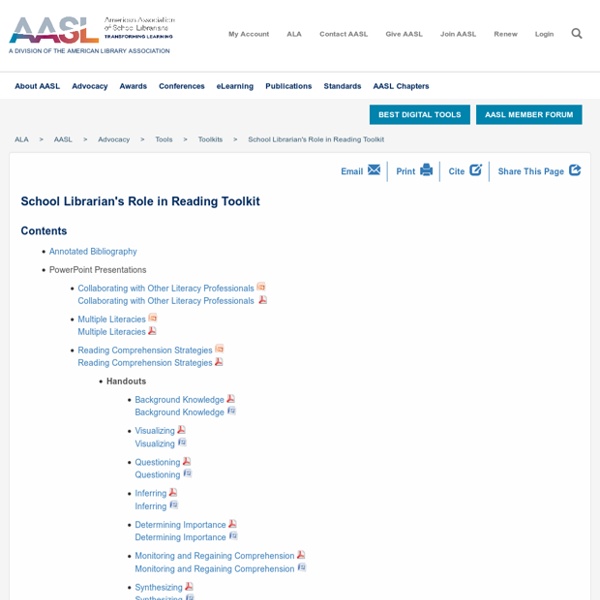



http://www.ala.org/aasl/advocacy/tools/toolkits/role-reading
Related: Lesson Plan Resources • COLLECTION: Promoting Reading • COLLECTION: Books and ReadingImpact: How-to Chapters It is important to take advantage of the flexibility of the Internet to provide educators with resources that were not available at the time of the book's publication or that were not included in the book. In addition to my experience teaching the lessons, school librarians from across the nation will be field testing the lessons. When they provide me with feedback, photographs, student work, and testimonials of their experiences, I will post it here. If you would like to field test a lesson and contribute to this site, please review the process on the Contribute page of this Web site.
Position Statement on the Value of Independent Reading in the School Library Program The following position statement is currently under review to align with the National School Library Standards. In an information age, literacy demands not only the ability to read and write, but also the ability to process information and communicate effectively. Research suggests that reading proficiency increases with the amount of time spent reading voluntarily. Unfortunately, independent reading is often a casualty in our fast paced, media-oriented society. Today's students know how to read but have little or no interest in doing so. They have failed to catch the love of reading; therefore, they choose not to read.
Wide Open Spaces: Learning from "Not-Just-Right" Books Every mother can relate to this maternal wisdom: The car is a perfect place for insightful conversations with your child. When my seven year old waits to share exciting news, secret concerns, or silly stories from the back seat, I am pleased but at the same time I wonder if she has figured out that drive time is a safe time to share her thoughts; has she decided and discovered that her A-type, energized teacher-mom cannot over-react, over-analyze, or over-talk while driving? I always try and take the time to journal about the car lessons my child shares as I wrestle with the universal parenting/teaching dilemma: when do you need to be the involved expert and when do you need to be a quiet listener? How long do you let a child struggle before you step in with your knowledge and experience? When does your child need to work through a situation independently? Learning to give a child space and time are lessons that have served me well both as a mother and teacher.
Authentic Assessment Toolbox Home Page to the Authentic Assessment Toolbox, a how-to text on creating authentic tasks, rubrics, and standards for measuring and improving student learning. Inside, you will find chapters on A good place to start -- In this chapter I identify the characteristics, strengths and limitations of authentic assessment; compare and contrast it with traditional (test-based) assessment. Why has authentic assessment become more popular in recent years?
12 Ways to Nurture a Love of Reading As a classroom teacher, nurturing a love of reading in my students was almost an obsession. This continued when I had a child. Here are twelve ways to nurture a love of reading in kids. 1. Strategies for online reading comprehension Imagine, if you will, that you are beside me as I peer over the shoulder of my twelve-year-old son. He’s using a web browser to search for an article on creating stop-motion movies, which is one of his hobbies. I barely have time to say, “That looks interesting,” before he has clicked on a hyperlink and is off on entirely different page. A video catches his eye and he ignores me completely as he hits the “play” button, only to discover the video is a commercial for an upcoming movie.
Position Statement on the School Librarian's Role in Reading Rationale: Reading is a foundational skill for 21st-century learners. Guiding learners to become engaged and effective users of ideas and information and to appreciate literature requires that they develop as strategic readers who can comprehend, analyze, and evaluate text in both print and digital formats. Learners must also have opportunities to read for enjoyment as well as for information. School librarians are in a critical and unique position to partner with other educators to elevate the reading development of our nation’s youth. Reading skills involve thinking skills. The extent to which young people use information depends upon their ability to understand what they read, to integrate their understandings with what they already know, and to realize their unanswered questions.
The Big Fresh October 3, 2015 The Tyranny of Levels Education has produced a vast population able to read, but unable to distinguish what is worth reading. G. M. Trevelyan Once upon a time, there was a third-grade girl, Daisy, who loved to read.